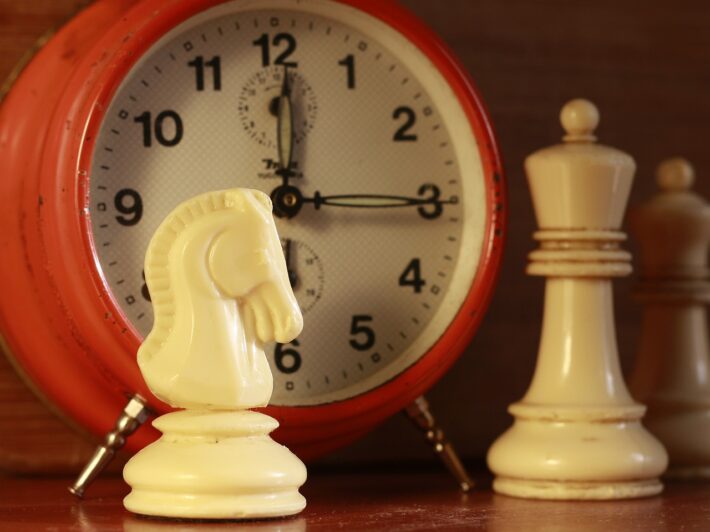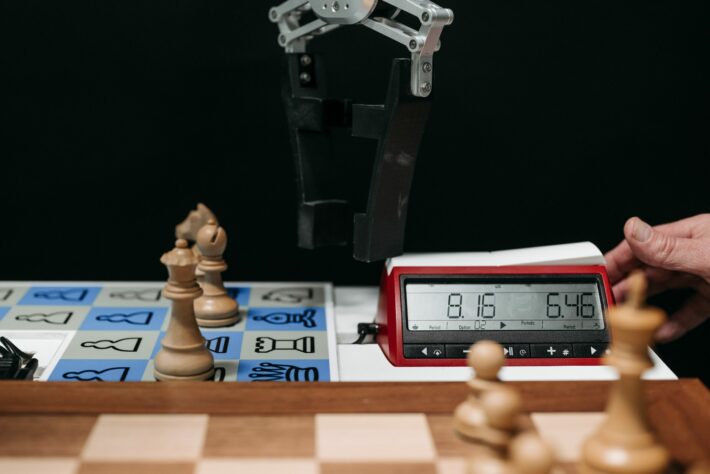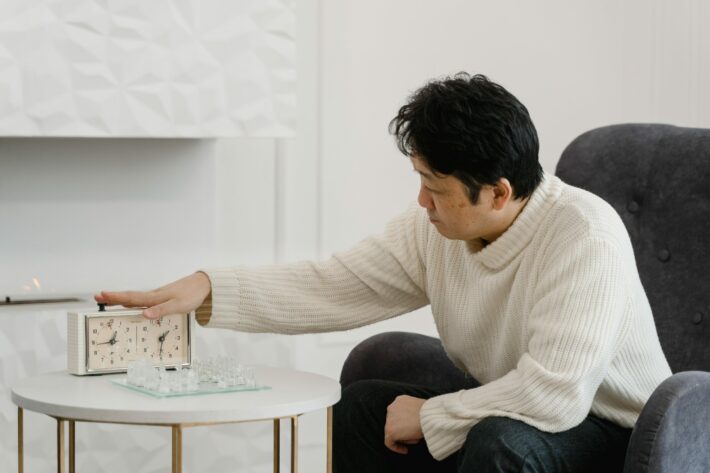Time is of the essence in the game of chess. Every move, every decision, and every strategy is bound by the ticking hands of the clock. In this fast-paced and strategic game, a chess timer becomes a crucial tool that can greatly impact your gameplay.
Choosing the right chess timer is not merely about finding a device to keep track of time; it’s about finding a companion that enhances your skills, helps you manage your time effectively, and adds an extra layer of excitement to your chess battles. So, if you’re ready to take control of time and elevate your game, join us on this journey as we explore the world of chess timers and discover the perfect match for your skill level.
How does a chess timer impact your gameplay?
When it comes to chess, time management is a fundamental aspect that can make or break a player’s strategy. A chess timer acts as a referee, ensuring fair play and adding an element of pressure to the game. It introduces the concept of “time control,” which means each player has a limited amount of time to make their moves.
This constraint forces players to think strategically, make decisions efficiently, and adapt to changing circumstances within the given time frame. A chess timer is not just a tool; it becomes an integral part of the chess experience, testing your mental agility and challenging your ability to perform under pressure.
What are the different types of chess timers available?
Chess timers come in various types, each with its unique features and functionalities. The two primary categories are digital and analog timers. Digital timers are electronic devices that display the remaining time on a digital screen, while analog timers are mechanical devices with physical hands indicating the time.
Both types have their advantages and cater to different preferences and playing styles. Digital timers offer precise time control, programmable options, and additional features like delays and increments. On the other hand, analog timers provide a nostalgic charm, simplicity, and a tactile experience that some players find appealing.
| Feature | Digital Chess Timer | Analog Chess Timer | Programmable Chess Timer |
|---|---|---|---|
| Time Control | Yes | Yes | Yes |
| Delay Feature | Yes | No | Yes |
| Increment Feature | Yes | No | Yes |
| Pre-set Options | Yes | No | Yes |
| Battery Life | Long-lasting | N/A | Long-lasting |
Which features should you consider when selecting a chess timer?

Choosing the right chess timer involves considering several key features that align with your gameplay preferences. Firstly, time control options are crucial. Look for timers that allow you to set various time controls, such as blitz, rapid, or classical.
Additionally, features like delay and increment can add flexibility to your games, giving you additional thinking time or compensating for quick moves. Consider the ease of use, durability, and portability of the timer as well. Some advanced timers offer programmable settings, pre-set options, and customizable sounds, which can enhance your overall experience.
Is a digital or analog chess timer better suited for your skill level?
Deciding between a digital or analog chess timer depends on your skill level and personal preference. Digital timers are often favored by serious tournament players or those who want precise time management. They provide accurate time tracking, multiple time control options, and additional features for advanced gameplay.
Analog timers, on the other hand, appeal to players seeking a traditional touch or a more casual gaming experience. They evoke nostalgia and simplicity while providing the necessary time control functions. Ultimately, it’s about finding the timer that resonates with you and enhances your enjoyment of the game.
How can beginners benefit from using a chess timer?
For beginners, a chess timer serves as an invaluable tool for skill development and learning time management. It instills discipline and helps them practice decision-making within a limited time frame.
By using a timer, beginners can gradually improve their pace of play, think more strategically, and learn to make efficient moves. Additionally, playing with a timer prepares beginners for competitive play and introduces them to the nuances of time control, an essential aspect of organized chess tournaments.
Are there specialized chess timers for advanced players?
Yes, there are specialized chess timers designed to cater to the needs of advanced players. These timers often offer advanced features like multiple time controls, delay options, and programmable settings. They are built to withstand intense gameplay and provide precise time management for high-level competitions.
Some advanced timers even come with additional functions like move counters, game timers, and memory capabilities, allowing players to review and analyze their games later. Investing in a specialized chess timer can greatly enhance the experience for advanced players seeking to sharpen their skills and compete at higher levels.
Can a chess timer improve your strategic thinking?
Chess timers have a significant impact on strategic thinking and decision-making during a game. The limited time constraint forces players to think quickly, prioritize moves, and make crucial decisions under pressure.
By regularly playing with a timer, you can train your brain to evaluate positions faster, anticipate opponent moves, and develop a more efficient decision-making process. Over time, this enhanced strategic thinking becomes a valuable skill that transcends the chessboard and can benefit you in various aspects of life.
What are the pros and cons of using a delay feature in a chess timer?

The delay feature in a chess timer adds a layer of complexity to the game. It grants a time buffer before the player’s clock starts ticking, allowing them to contemplate their move without losing any time. The delay feature can be advantageous as it provides more thinking time and reduces the chances of making hasty moves.
However, some players argue that it slows down the game and disrupts the rhythm. It’s a matter of personal preference and playing style, and players should experiment with the delay feature to determine if it suits their gameplay.
Are there any recommended chess timers for tournament play?
When it comes to tournament play, reliability, accuracy, and ease of use are paramount. Several renowned brands offer reliable chess timers that are commonly used in official tournaments. The DGT (Digital Game Technology) chess timers are highly regarded for their precision and functionality.
The DGT3000 and DGT2010 models are popular choices among tournament players. Other reputable brands include Chronos and Saitek, which produce timers known for their durability and tournament-standard features. It’s essential to check the tournament regulations or consult with organizers to ensure the timer you choose meets the specific requirements.
Should you invest in a programmable chess timer?
Investing in a programmable chess timer can be beneficial, especially if you enjoy experimenting with different time controls and settings. Programmable timers offer versatility, allowing you to tailor the time control options to your specific needs.
They can accommodate various game formats and time increments, making them suitable for both casual play and competitive tournaments. Additionally, programmable timers often have pre-set options that simplify the process of selecting time controls, making them user-friendly and convenient.
Can a chess timer help you manage your time effectively?
Undoubtedly, a chess timer is a powerful tool for time management. By playing with a timer, you learn to allocate your time wisely, prioritize moves, and manage the clock effectively.
This skill translates beyond the chessboard and can be applied to real-life situations where time management is crucial. The pressure created by a ticking timer teaches you to think faster, make quicker decisions, and perform under time constraints, honing your ability to manage tasks efficiently and meet deadlines.
How does a chess timer impact your decision-making under pressure?
Chess is not only a battle of moves but also a test of mental resilience. Playing with a timer exposes you to a unique form of pressure that simulates real-life decision-making scenarios.
The ticking clock adds intensity and urgency, forcing you to think swiftly and make critical decisions under stress. Over time, this pressure becomes a familiar sensation, and you learn to stay calm, focus, and make confident moves even in high-stakes situations. The ability to make sound decisions under pressure is a valuable skill that extends far beyond the chessboard.
Are there any budget-friendly options for chess timers?

If you’re on a tight budget, fret not! There are budget-friendly options available that can still serve your needs effectively. Many digital chess timers offer basic functionalities at an affordable price range.
Look for timers that provide essential time control features without compromising on quality and accuracy. These timers may not have advanced settings or additional features but will still serve their primary purpose of keeping track of time during your chess games.
What are the essential functions every chess timer should have?
Regardless of your skill level, there are a few essential functions that every chess timer should possess. Firstly, accurate time tracking is crucial. The timer should provide precise timing, ensuring fair play and reliable gameplay. It should also offer adjustable time controls, allowing you to set the desired time limits for your games.
Additionally, a pause/resume function is essential for breaks during the game or when analyzing positions. Lastly, a clear and easily readable display is necessary for quick reference and seamless gameplay.
How can you maintain and care for your chess timer to ensure longevity?
To ensure the longevity of your chess timer, a few simple maintenance steps can go a long way. Firstly, avoid exposing the timer to extreme temperatures or humidity, as it can affect its functionality.
Clean the timer regularly using a soft, lint-free cloth to remove dust and debris. If your timer uses batteries, replace them promptly when they run out to prevent leakage and damage to the internal components. Finally, store the timer in a safe and dry place when not in use to protect it from accidental damage.
Final Takeaways: Mastering Time in Chess
In the game of chess, time is a precious resource that shapes the flow of gameplay and challenges players to make thoughtful decisions under pressure. Choosing the perfect chess timer is more than finding a mere timekeeping device; it’s about finding a companion that enhances your skills, promotes strategic thinking, and adds excitement to your games.
Whether you opt for a digital or analog timer, consider the features that align with your playing style and skill level. Invest in a reliable timer that meets tournament standards if you aspire to compete.
Embrace the challenges posed by the ticking clock and let it sharpen your decision-making abilities both on and off the chessboard. So, embark on this time-bound journey, and may every move you make be a step toward mastering the art of chess.




